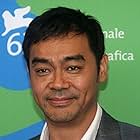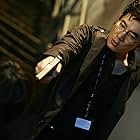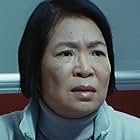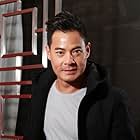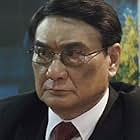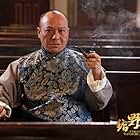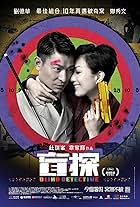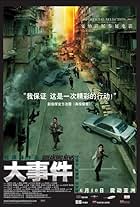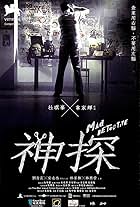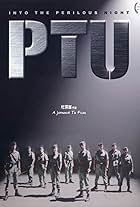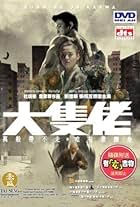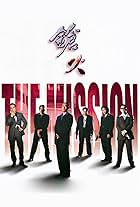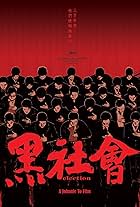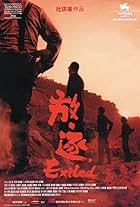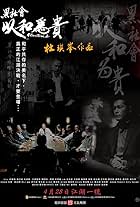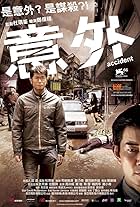IMDb RATING
6.9/10
2.8K
YOUR RATING
Three people - a criminal, a bank officer and a cop - end up in a catastrophic situation in the midst of a global economical crisis and are forced to betray any morals and principles to solv... Read allThree people - a criminal, a bank officer and a cop - end up in a catastrophic situation in the midst of a global economical crisis and are forced to betray any morals and principles to solve their financial problems.Three people - a criminal, a bank officer and a cop - end up in a catastrophic situation in the midst of a global economical crisis and are forced to betray any morals and principles to solve their financial problems.
- Awards
- 17 wins & 28 nominations
Richie Jen
- Inspector Cheung
- (as Richie Ren)
Eddie Cheung
- Wah
- (as Siu-Fai Cheung)
Siu-Kay Lee
- Brother Four
- (as Siu-Kei Lee)
Storyline
Did you know
- TriviaDebuted at the second spot of the Hong Kong box office and held the position in its second week.
- ConnectionsReferenced in Boundless (2013)
Featured review
Pale color background, 70's and 80's scene set-up, steady frame shot, constant tempo, dramatic directing and acting; the film is full of old day's sentiments, yet it's a story happening in the overwhelmingly prosperous year 2010. Such a misplacement to reflect the most confusing and unbreakable issue that is troubling everyone in the metropolis gives a strong implication of a totally turning upside down era where boundary between right and wrong doesn't exist anymore. Things realigned according to past social order cannot stand the wave of time change; social value, moral standard, principle are all becoming useless and destroyed. No matter how hard one tries to reset it, it's no more than a joke that nobody would pay attention.
As people are turning to a dead end corner, surprises might turn up to help. On the other hand, those who think they can figure out everything not losing a penny might not be as wise as they presume they are, or somehow be ruined by their wisdom. Lo and Keung thought they are the winner of the game; even though they persist until the last breath, their fatal ending wouldn't change. Denise Ho and Lau, playing honest roles ever, should have been the loser of the game, but thanks to an accident, they both live a decent life thereafter without spending an effort. It's not strange or new to see fate or coincidence happening to the characters in Johnny To's film, but being put in a world of misplacement, this time it looks more like an accident than it's under fate, leading to an even more absurd ending where the world is totally unpredictable that one can't reason it. Mankind relies on accident and luck to settle down, that is a laughable grief.
The film, however; doesn't seem to rule out hard work could bring return, at least Wong, the role of recyclable paper collector, has enough significance. Unfortunately just a while later we see an old working class having fallen under the fade-out group of the society trying to kill himself. The script is actually talking to itself debating over the subject. It even further elaborates by condemning through the characters' dialog. The most remarkable one is the confession by JJ Jia in the police station. Her brilliant acting has turned uncontrollably subconscious contradiction within into reasonable greed. What a marvelous demonstration of metropolis ridiculousness!
Sensibility might not win in this battle against absurdity. Richie Ren has been in a terribly confusing state struggling deeply within throughout the entire film. Not to mention the incidents he faces as a police inspector, he has yet to deal with a lot of personal problems such as his wife's persistence to purchase an apartment under the high market price, a seriously sick father and the sudden arrival of a younger sister by the mysterious wife of his father. These, however; are not dramatic enough to constitute irony effect, so the director has to arrange his wife coming to a sudden awakening by seeing him would die as the ending of the story. All these have come together too fast that Richie Ren is unable to react. He acts in such a slow-reflex way that has conveyed his thoughts of questioning "what's going on with my fate?" He rather believes it's all a coincidence. By taking away one's fate, he loses control over his life and all that left to him is coincidence. He has to pray for this for the rest of his life.
Although the script is full of condemns to reality, the director has remained himself as an outsider with a very calm view over what is happening. The shots are all apathetic, just like people ignoring what is happening around them every day. This metaphor is too good, really too good that it might need another accidental coincidence to wake up the audiences before they would even notice it.
As people are turning to a dead end corner, surprises might turn up to help. On the other hand, those who think they can figure out everything not losing a penny might not be as wise as they presume they are, or somehow be ruined by their wisdom. Lo and Keung thought they are the winner of the game; even though they persist until the last breath, their fatal ending wouldn't change. Denise Ho and Lau, playing honest roles ever, should have been the loser of the game, but thanks to an accident, they both live a decent life thereafter without spending an effort. It's not strange or new to see fate or coincidence happening to the characters in Johnny To's film, but being put in a world of misplacement, this time it looks more like an accident than it's under fate, leading to an even more absurd ending where the world is totally unpredictable that one can't reason it. Mankind relies on accident and luck to settle down, that is a laughable grief.
The film, however; doesn't seem to rule out hard work could bring return, at least Wong, the role of recyclable paper collector, has enough significance. Unfortunately just a while later we see an old working class having fallen under the fade-out group of the society trying to kill himself. The script is actually talking to itself debating over the subject. It even further elaborates by condemning through the characters' dialog. The most remarkable one is the confession by JJ Jia in the police station. Her brilliant acting has turned uncontrollably subconscious contradiction within into reasonable greed. What a marvelous demonstration of metropolis ridiculousness!
Sensibility might not win in this battle against absurdity. Richie Ren has been in a terribly confusing state struggling deeply within throughout the entire film. Not to mention the incidents he faces as a police inspector, he has yet to deal with a lot of personal problems such as his wife's persistence to purchase an apartment under the high market price, a seriously sick father and the sudden arrival of a younger sister by the mysterious wife of his father. These, however; are not dramatic enough to constitute irony effect, so the director has to arrange his wife coming to a sudden awakening by seeing him would die as the ending of the story. All these have come together too fast that Richie Ren is unable to react. He acts in such a slow-reflex way that has conveyed his thoughts of questioning "what's going on with my fate?" He rather believes it's all a coincidence. By taking away one's fate, he loses control over his life and all that left to him is coincidence. He has to pray for this for the rest of his life.
Although the script is full of condemns to reality, the director has remained himself as an outsider with a very calm view over what is happening. The shots are all apathetic, just like people ignoring what is happening around them every day. This metaphor is too good, really too good that it might need another accidental coincidence to wake up the audiences before they would even notice it.
- philaychan
- Oct 28, 2011
- Permalink
- How long is Life Without Principle?Powered by Alexa
Details
- Release date
- Country of origin
- Official sites
- Language
- Also known as
- Đoạt Mệnh Kim
- Production companies
- See more company credits at IMDbPro
Box office
- Gross worldwide
- $1,203,873
- Runtime1 hour 47 minutes
- Color
- Sound mix
- Aspect ratio
- 2.35 : 1
Contribute to this page
Suggest an edit or add missing content

Top Gap
By what name was Life Without Principle (2011) officially released in Canada in English?
Answer









